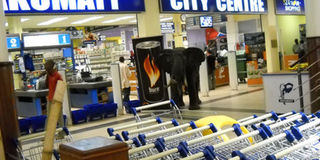Nakumatt’s fairy tale ends in a bruising way

Creditors on Tuesday voted to fold Nakumatt after a report said it was going to be very expensive to turnaround the supermarket. FILE PHOTO
The story of Nakumatt occupied media space for many years but none told of its eventual collapse.
Nakumatt for years was run by a closely knit family led by Atal Shar. It was a burgeoning enterprise that massively invested in regional expansion.
In fact, very few or none at all knew of its financial bleeding until the dirt could no longer be hidden from the public.
The directors, mainly composed of Shar’s family, kept the dirt away from the roving eye of the public.
The company, according to South Africa-based rating agency - Global Credit Ratings – had largely funded its growth using short-term debt at the beginning of the decade that would later come back to haunt it.
At the close of 2016, things were beginning to go out of hand and this is when the world woke up to the looming collapse of once one of East Africa’s most admired brands.
Directors and employees had been buffeting on the company through insider lending and emptying shelves.
Loans had become so large to service and the supermarket had resorted to soft and short-term loans to pay basics. But still, this was not sustainable.
At the end of 2016, Global Credit Ratings, which had been rating the company’s financial position for a number of years, downgraded Nakumatt’s rating to BB Negative (BB-), resulting from failure to service large short-term debts, pay suppliers and staff salaries.
This meant that there was just a handful of options from which Nakumatt could draw credit to fund its operations.
In notes published along the rating, Sheri Few, the Global Credit Ratings senior credit analyst, said the downgrade reflected a notable deterioration in Nakumatt’s credit risk profile that had partly resulted from large expenditure towards servicing short-term debts acquired to pursue an ambitious expansion drive towards the end of 2010.
“Growth of the business has been largely funded through short-term debt. This has seen Nakumatt’s total debt burden grow rapidly, placing undue pressure on the company’s liquidity [cash flow] position,” he said.
In fact, this heavily impacted operational process with the company failing to raise money to pay suppliers and other tax-related levies.
Therefore, as it might have turned out, creditors on Tuesday voted unanimously to fold the once giant retailer after efforts to revive the supermarket chain had failed.
It could have been a painful decision but it was the right thing to do since the company in its current form cannot pay the $380m debt due to banks, suppliers and landlords.
Court will decide on the liquidator on January 17, marking the formal end of the Nakumatt brands.
The liquidation plan has already been presented by Peter Kahi.
Kahi had been appointed by court to try to revive the troubled retail chain.
But the task at hand seemed to have failed him thus choosing to toss the ball back to the creditors who in turn decided to let go in a meeting on Tuesday.
“An attempted turnaround of the business would be very costly and the company is likely to be lossmaking for the better part of the turnaround window, implying that such a turnaround would need to be financed by additional debt to sustain operations before achieving breakeven,” Kahi had said last week.
Difficult to source funding
The company had also been stripped of some of its assets. Therefore, in such circumstances it was going to be difficult to secure credit to fund the turnaround.
“The company also has no assets to collateralise such additional funding. The administrator is of the view that it is likely to be difficult to attract an investor to inject the substantial amount of equity required to restructure NHL’s [Nakumatt Holding Limited] balance sheet due to the current high degree of financial leverage,” Kahi said.
Nakumatt went into voluntary supervision in early 2018 after seeking protection from its creditors.
The company had already closed off its regional operations in Uganda, Tanzania and Rwanda on the back of rising suppliers’ debt and failure to pay rent space for its stores.
Nakumatt, which grew from a mattress shop in Nakuru to have branches across Kenya and East Africa, was forced to shut dozens of outlets from 2017 as it struggled to repay its suppliers, landlords and other creditors.
Sought protection
By February 2017, it had 60 branches that dropped to six in September 2018.
The six branches were sold to Naivas in a deal worth $4.2m in November.
Its sales dropped $90m in the year to February down from $519m in a similar period in 2017.
The company sought protection using Kenya’s newly enacted company laws, which provide a pathway for distressed firms to avoid complete collapse. But also, this failed. There were just a few options for a company some whose finances had been abused.
A report released early last week indicated that at least $100m has been illegally siphoned from the company.
Some of this had been lent out to some directors without interest.




